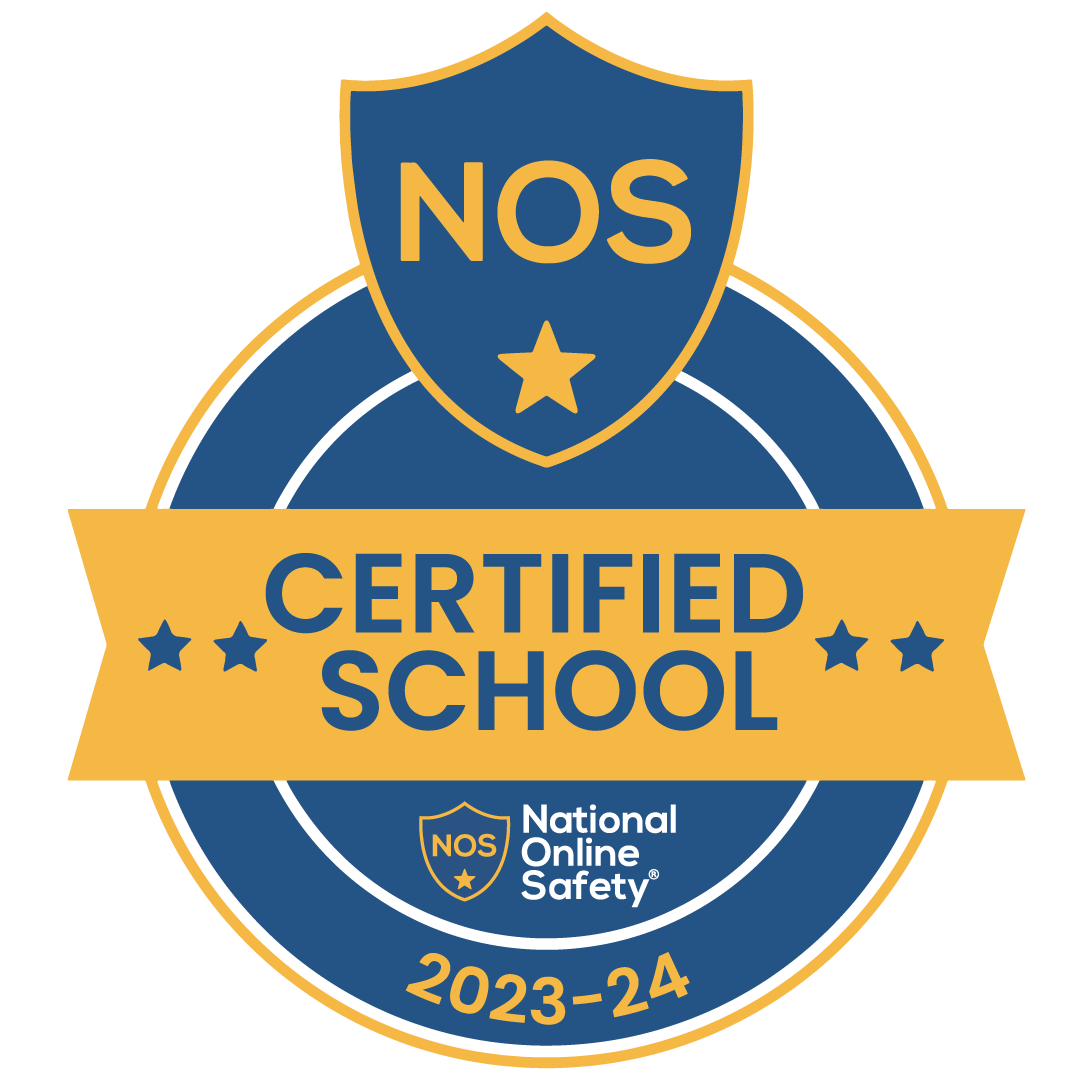Computing and Business
Department Staffing & Roles
- Miss H Lyne – Teacher of Computing & Business/Head of Department
- Mrs K Hatch – Teacher of Computing & Business/Senior Assistant Principal
- Mrs L Barratt – Teacher of Computing & Business/Director of Pupil Support Centre
- Ms L Davies – Teacher of Computing & Business/Careers Lead
Key Stage 3
In the Computing and Business department we are constantly evaluating and improving the curriculum throughout Key Stage 3 to ensure that the breadth of knowledge and experiences that are on offer meet the national curriculum needs. The aim of the computing curriculum is to provide pupils with a challenging curriculum that addresses the opportunities and future development of technology and the business world. Pupils will gain secure knowledge and skills which will encourage them to use technology to create art, solve problems and develop computational thinking skills. Pupils will understand how computers work, how to be safe digital citizens and design and program robust solutions.
We will incorporate ideas and extend understanding from a range of other subjects outside of IT and Computing including DT, Graphics, Maths, Science and Personal Development that help build the skills for successful enterprises that are transferable. With these skills pupils will then be able to relate their understanding of computing to real world scenarios and develop their understanding of key skills that are required in a modern working environment. Our vision follows the spiral curriculum model that is designed to allow students to progress at their own pace but build up knowledge and understanding every time we revisit a topic. This allows for a flowing process from Year 7 and through the GCSE content by the end of Year 11.
Key Stage 4
We offer 3 option subjects at KS4; AQA GCSE in Computer Science, Edexcel Level 2 BTEC in Digital Information Technology and Edexcel GCSE Business.
AQA GCSE in Computer science
AQA GCSE in Computer science will build on the knowledge, understanding and skills established through the Computer Science elements of the Key Stage 3 programme of study. The content has been designed not only to allow for a solid basis of understanding but to engage learners and get them thinking about real world application. The specification encourages learners to be inspired, and challenged through completing a coherent, satisfying and worthwhile course of study. The specification will help learners to gain an insight into related sectors. It will prepare learners to make informed decisions about further learning opportunities and career choices.
Edexcel Level 2 BTEC in Digital Information Technology
Edexcel Level 2 BTEC in Digital Information Technology is a course designed to create confident users of ICT applications. Students will learn how to use a number of software packages and apply these into a business context. This course gives students the foundations into how their data is harvested and used for a number of business purposes. Equivalent to one GCSE, this qualification will help students develop the knowledge and skills needed to go on to further education in IT or computing.
Edexcel GCSE in Business
Edexcel GCSE in Business GCSE Business is a rich and varied subject that prepares students for all aspects of working life. No matter what industry students will eventually find themselves in after their learning journey, they will need to work successfully and understand the nature of working in an organisation with other people and clear objectives. People who are successful in business not only transform their own lives but the lives of others, James Dyson helped keep our houses clean and Steve Jobs connected us to the world around us through his revolutionary Apple products. Business is a broad and fascinating subject that keeps evolving with the world that we live in as employers, employees and consumers do to.
Key Stage 3
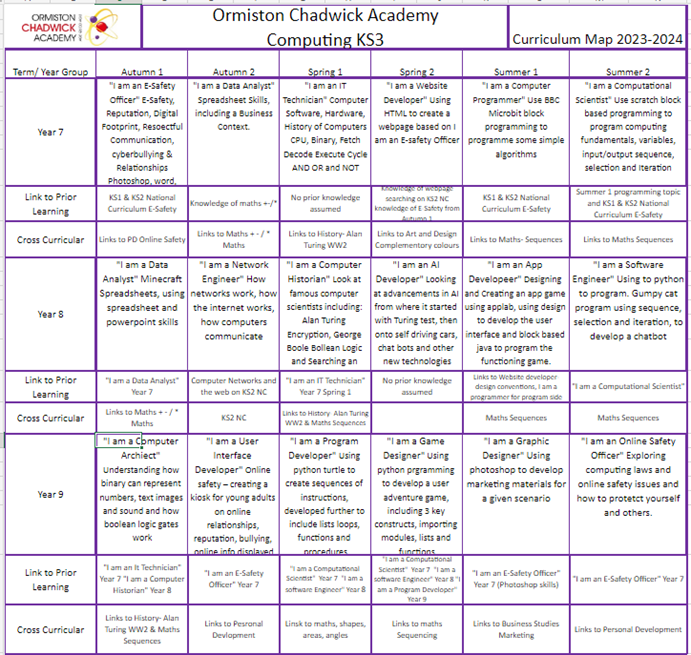
Key Stage 4
AQA GCSE Computer Science (9-1)
AQA’s GCSE (9–1) in Computer Science allows students to:
- understand and apply the fundamental principles and concepts of Computer Science, including abstraction, decomposition, logic, algorithms, and data representation;
- analyse problems in computational terms through practical experience of solving such problems, including designing, writing and debugging programs;
- · think creatively, innovatively, analytically, logically and critically;
- understand the components that make up digital systems, and how they communicate with one another and with other systems;
- understand the impacts of digital technology to the individual and to wider society;
- apply mathematical skills relevant to Computer Science.
OCR GCSE Computer Science (9-1) J277 Mapping
Please click here to view the GCSE Computer Science exam board specification
Key Stage 4 Computing Map
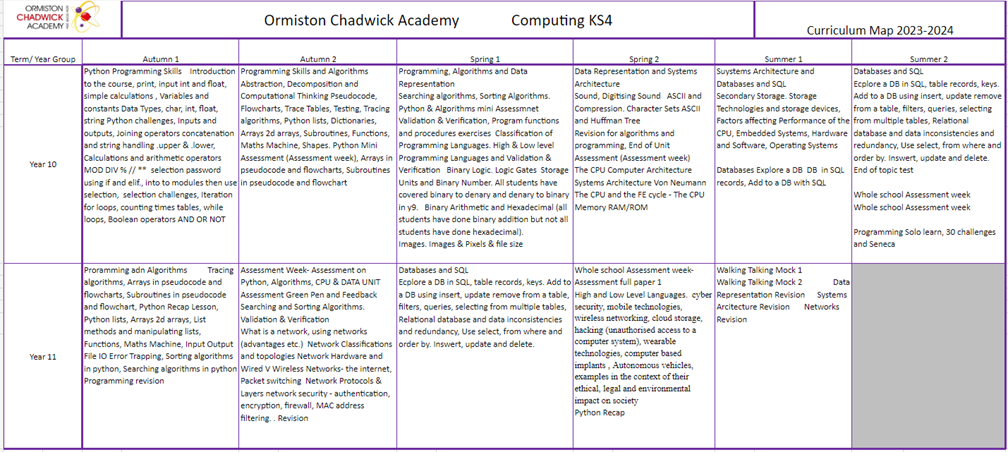
Edexcel BTEC Digital Information Technology
Edexcel BTEC in Digital Information Technology allows students to:
- explore user interface design and development principles
- investigate how to use project planning techniques to manage a digital project
- discover how to develop and review a digital user interface
- explore how data impacts on individuals and organisations
- draw conclusions and make recommendations on data intelligence
- develop a dashboard using data manipulation tools
- explore how organisations use digital systems and the wider implications associated with their use
Edexcel BTEC Digital Information Technology Mapping Overview
Please click here to view the BTEC DIT exam board specification
EDEXCEL GCSE business (9-1) 1bs0
Edexcel’s GCSE (9–1) in Business allows students to:
- know and understand business concepts, business terminology, business objectives, the integrated nature of business activity and the impact of business on individuals and wider society
- apply knowledge and understanding to contemporary business issues and to different types and sizes of businesses in local, national and global contexts
- develop as enterprising individuals with the ability to think commercially and creatively to demonstrate business acumen, and draw on evidence to make informed business decisions and solve business problems
- develop as effective and independent students, and as critical and reflective thinkers with enquiring minds
- use an enquiring, critical approach to make informed judgements
- investigate and analyse real business opportunities and issues to construct well-argued, well-evidenced, balanced and structured arguments, demonstrating their depth and breadth of understanding of business
- develop and apply quantitative skills relevant to business, including using and interpreting data.
Key Stage 4 Business Studies Map

Our curriculum strives to meet the Gatsby Benchmarks to provide our pupils with the skills and insight to develop their aspirations and explore careers they might be interested in. Upon successful completion of a Computer Science GCSE or Information Technology qualification on, learners may progress into employment within the IT/Computing industry and/or continue their study in the vocational area (e.g. AS/A level ICT, Computing or Computer Science, BTEC Nationals Level 3, dependent upon individual post-16 establishment entry requirements). IT has become an integral part of learning, the ability to create professional documents, manipulate data and deliver high quality presentations is a vital skill that can be used in further learning and work placements.IT skills are used in a variety of job roles in all kinds of organisations including those in manufacturing, retail, education, hospitality, health and social care, business services, transport and public services.
We are developing partnerships with local enterprises to enhance the curriculum and give pupils a greater understanding of their local community. We are continuing to expand our connections with local businesses and if anyone would like to help us, please contact the school and ask to speak to Mrs Hatch or Miss Davies. There are plenty of opportunities after completing a BTEC in Enterprise in post 16 education for further learning. Learners might consider progression to the study of a vocational qualification at Level 3, such as a BTEC National in Enterprise and Entrepreneurship, which prepares them to enter employment or apprenticeships, or to move on to higher education by studying a degree in the business sector.
Possible career paths
- Database administrator
- Games developer
- Information systems manager
- IT consultant
- Multimedia programmer
- Network engineer
- Systems analyst
- Systems developer
- Business manager
- Business entrepreneur
- Business advisor
- Business analyst
- Data analyst
- Project manager
At Ormiston Chadwick Academy our year 11 follow a whole school intervention programme. This includes revision sessions 3pm to 4pm for pupils to catch up with missing work or revise with their teacher. We also have several Saturday Academies which run for 2 hours on a Saturday morning. This means that pupils who have no IT access at home will not be disadvantaged and can complete any work in school with the support of their teacher. Slots after school are also available for all pupils in our computer club. Pupils can complete revision and homework with the support of our staff.
The department is excited to soon be able to offer 3D printing club as part of our enrichment program. All are welcome.
KS4 Revision Material
CGP GCSE AQA Computer Science revision guide
How to use this resource: This can be used to create mind maps or quizzes. This can then be used to check subject knowledge and understanding. There are also some exam questions and quiz questions created at the end of every unit. This is particularly useful for checking and revising subject knowledge.
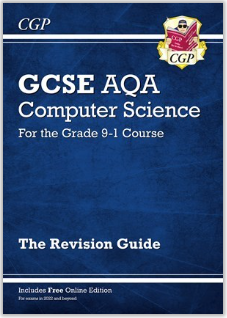
CGP GCSE AQA Computer Science Exam Practice workbook
How to use this resource: Students will be issued with a CGP Exam Practice workbook. This can be used to develop and refine their approach to their final year exams. This workbook will be issued in Year 11 to support their preparation for the final exams. The workbook contains answers; allowing for students to check their quality and accuracy of their answers.
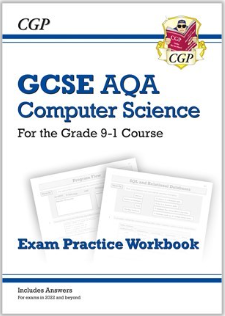
CRAIG ‘N’ DAVE videos
How to use this resource: Pupils have access to videos that explain each topic in some detail. Pupils have been using this resource each week for homework. (https://student.craigndave.org/)
Edexcel BTEC Digital Information Technology
Student Book
How to use this resource: This book covers all content from all three components; reinforcing the learning that takes place in the classroom and giving them questions to test their knowledge and understanding. Some copies are available to be used in the classroom.
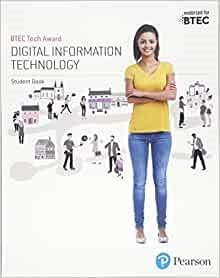
Pearson revision guide
How to use this resource: This can be used to create mind maps or quizzes. This can then be used to check subject knowledge and understanding. There are also some exam questions and quiz questions created at the end of every unit. This is particularly useful for checking and revising subject knowledge.
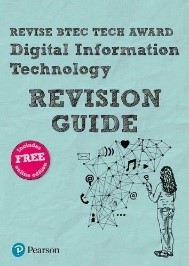
Pearson Practice Assessment Plus +
How to use this resource: This resource is useful for practising the skills you need for the external assessment. Within this resource there are four practice assessments, with guidance and support focusing on how to structure your answer. This resource is supported by the Revision guide which you also have a copy of, which is referred to throughout.
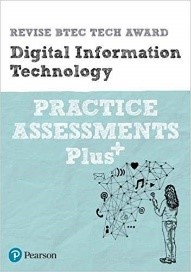
CGP GCSE EDEXCEL Business revision guide
How to use this resource
This can be used to create mind maps or quizzes. This can then be used to check subject knowledge and understanding. There are also some exam questions and quiz questions created at the end of every unit. This is particularly useful for checking and revising subject knowledge.
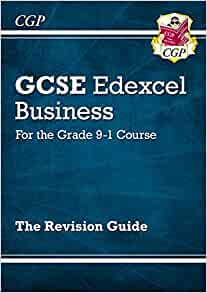
Pupils will also have the opportunity to engage in extracurricular activities which are usually cross curricular and incorporate over subjects mainly from a STEM background. In previous years students have completed challenges by Liverpool University, the ‘Rollercoaster Challenge’ by
Seamans and the Matrix Challenge. Computer Science pupils have also had the opportunity to recently visit Darsebury labs, and have a future planned trip to Bletchley park.


